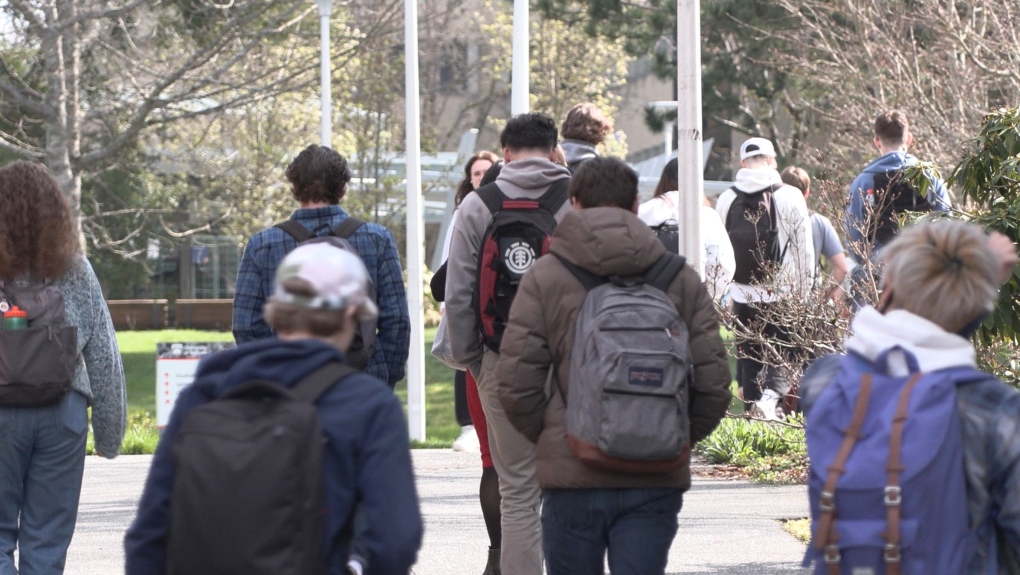B.C. students call on province to cool rising tuition
 Students are pictured at the University of Victoria. March 29, 2022 (CTV News)
Students are pictured at the University of Victoria. March 29, 2022 (CTV News)
The BC Federation of Students wants the provincial government to provide more funding to the post-secondary system to bring down what it calls sky-rocketing tuition.
According to the federation, tuition fees have more than doubled since 2001. In 2000, the average fee was $2,500, while in 2019, the average was over $5,900, according to the federation.
Those rising fees, paired with the rise in inflation, is putting graduation from a college or university out of reach for many, said the student group.
That financial strain for students is then contributing to the labour shortage affecting many sectors in the province, according to the federation.
"We want institutions to be adequately funded so students don’t have to pay as much, so that their enrollment rates stay consistent," said Quinn Cunningham, secretary treasurer for the BC Federation of Students.
"[We want] people around the world see our post-secondary education system as a high-quality level of education and continue to come here to study and invest in our economy and our workforces," he said.
Cunningham said colleges and universities were hit hard during the pandemic when international student enrollment dropped off, which schools had become reliant on for the higher tuition fees they pay.
The federation says $200 million is needed to stabilize funding for post-secondary institutions.
The student group points to the 1970s when colleges and universities where publicly fund by more than 90 per cent. Public funding dropped to 80 per cent in the 80s and continued to drop to about 50 percent today.
In a statement, the Ministry of Post-Secondary Education and Future Skills said it recognizes the affordability challenges that students in B.C. are facing.
It added that it is taking many measures to make post-secondary education more affordable and accessible through funding and programs.
That includes:
- More than 55,000 students have received over $85 million in funding through the BC Access Grant launched in 2020 to help with costs such as tuition and living expenses.
- It has ended interest payments on student loans, saving students approximately $40 million since 2019.
- More than 7,700 student housing beds have opened or are underway, with more to come, allowing students to find affordable, on-campus housing, with plans to invest $575 million for student housing over three years and $1.1 billion over 10 years.
- The government is investing $151 million for increased student loan funding to help make education more accessible and affordable for people.
- Investments in zero-cost textbooks have saved students over $31 million.
The ministry's statement added that Budget 2023 included $1.6 billion in post-secondary education and training funding.
It also said its Tuition Limit Policy ensures tuition and fee increases remain low and predictable by maintaining a two per-cent cap on domestic tuition and mandatory fees annually at B.C.’s public post-secondary institutions.
Lastly, the province said it "will keep working with students to continue to make post-secondary education more affordable in British Columbia."
CTVNews.ca Top Stories

DEVELOPING Person on fire outside Trump's hush money trial rushed away on a stretcher
A person who was on fire in a park outside the New York courthouse where Donald Trump’s hush money trial is taking place has been rushed away on a stretcher.
Mandisa, Grammy award-winning 'American Idol' alum, dead at 47
Soulful gospel artist Mandisa, a Grammy-winning singer who got her start as a contestant on 'American Idol' in 2006, has died, according to a statement on her verified social media. She was 47.
She set out to find a husband in a year. Then she matched with a guy on a dating app on the other side of the world
Scottish comedian Samantha Hannah was working on a comedy show about finding a husband when Toby Hunter came into her life. What happened next surprised them both.
'It could be catastrophic': Woman says natural supplement contained hidden painkiller drug
A Manitoba woman thought she found a miracle natural supplement, but said a hidden ingredient wreaked havoc on her health.
Young people 'tortured' if stolen vehicle operations fail, Montreal police tell MPs
One day after a Montreal police officer fired gunshots at a suspect in a stolen vehicle, senior officers were telling parliamentarians that organized crime groups are recruiting people as young as 15 in the city to steal cars so that they can be shipped overseas.
Vicious attack on a dog ends with charges for northern Ont. suspect
Police in Sault Ste. Marie charged a 22-year-old man with animal cruelty following an attack on a dog Thursday morning.
The Body Shop Canada explores sale as demand outpaces inventory: court filing
The Body Shop Canada is exploring a sale as it struggles to get its hands on enough inventory to keep up with "robust" sales after announcing it would file for creditor protection and close 33 stores.
Tropical fish stolen from Beachburg, Ont. restaurant found and returned
Ontario Provincial Police have landed a suspect following a fishy theft in Beachburg, Ont.
U.S. FAA launches investigation into unauthorized personnel in cockpit of Colorado Rockies flight to Toronto
The U.S.’s Federal Aviation Administration is investigating a video that appears to show unauthorized personnel in the cockpit of a charted Colorado Rockies flight to Toronto.

































